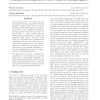11 search results - page 2 / 3 » On the Complexity of Iterated Weak Dominance in Constant-Sum... |
AAAI
2004
13 years 6 months ago
2004
We develop an exact dynamic programming algorithm for partially observable stochastic games (POSGs). The algorithm is a synthesis of dynamic programming for partially observable M...
ICML
2004
IEEE
14 years 5 months ago
2004
IEEE
A fast-growing body of research in the AI and machine learning communities addresses learning in games, where there are multiple learners with different interests. This research a...
TARK
2005
Springer
13 years 10 months ago
2005
Springer
Two natural strategy elimination procedures have been studied for strategic games. The first one involves the notion of (strict, weak, etc) dominance and the second the notion of...
EVOW
2010
Springer
13 years 3 months ago
2010
Springer
The emergence of Grim Trigger as the dominant strategy in the Iterated Prisoner Dilemma (IPD) on a square lattice is investigated for players with finite memory, using three differ...
LORI
2009
Springer
13 years 9 months ago
2009
Springer
We present in this work a sound and complete modal logic called EDLA (Epistemic Dynamic Logic of Agency) integrating the concepts of joint action, preference and knowledge and ena...

